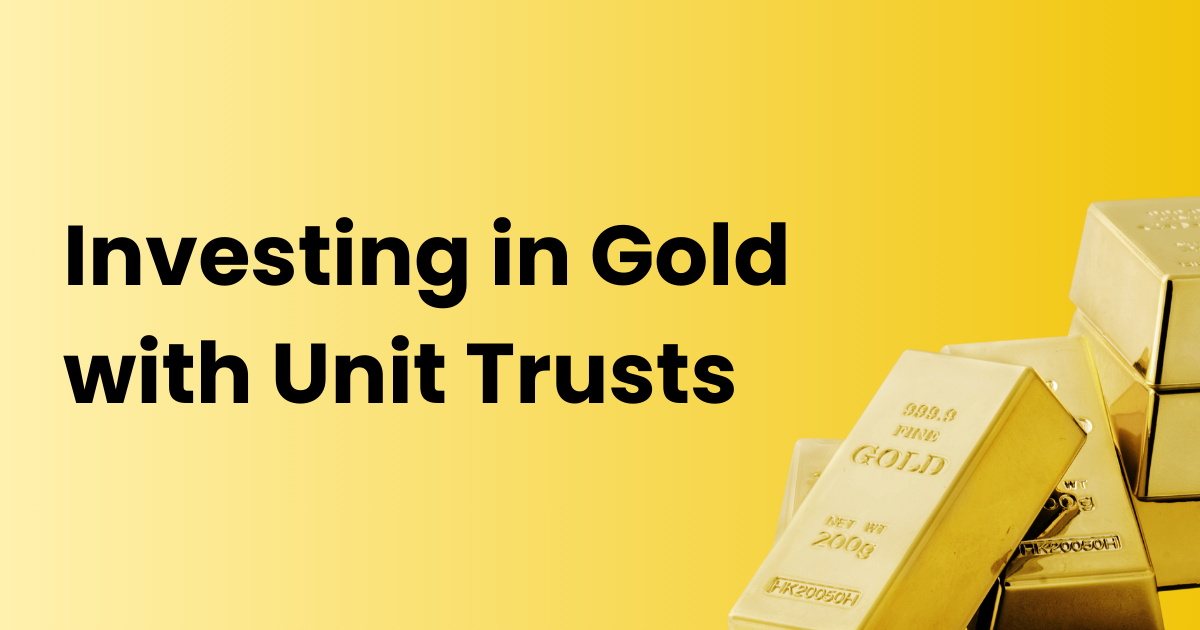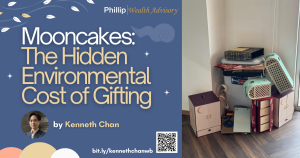Investing in Gold with Unit Trusts June 7, 2024

When gold was first discovered about 4500 years ago, it was valued for its malleability and ductility, making it easy to shape into intricate patterns, for jewellery. In modern times, gold has remained an all-weather store of value, contributing to its current status as the reserve asset of central banks. Retail investors also trade in gold for the following reasons:

Common reasons to invest in gold
- Hedge Against Inflation: Gold has historically maintained its value over the long term, making it a strong hedge against inflation. As the cost of living increases, the value of gold tends to rise alongside it.
- Safe Haven Asset: During times of economic uncertainty or geopolitical tension, investors often turn to gold as a safe haven asset. Its value is not directly tied to any specific country’s economy or political stability, making it a reliable store of value.
- Diversification: Gold can diversify an investment portfolio, reducing risk. Its price movements are often uncorrelated with those of other assets like stocks and bonds providing a buffer against market volatility.
- Liquidity: : Gold is a highly liquid asset, meaning it can be easily bought and sold. There’s always a market for gold, whether in the form of bullion, coins, or digital gold investments.
However, there are some things one should take note when investing in gold:
- No Yield: Gold does not pay dividends or interest. Unlike stocks or bonds, the only return on investment comes from price appreciation, which may not occur over your desired investment horizon.
- High Volatility: The price of gold can be highly volatile in the short term, influenced by changes in market sentiment, monetary policy, and global economic indicators. This volatility can lead to substantial fluctuations in investment value.
- Opportunity Cost: Investing a significant portion of your portfolio in gold could mean missing out on the potentially higher returns offered by other investments, such as stocks or real estate.
- Regulatory and Market Risks : Changes in government policies regarding gold ownership or taxation can affect its attractiveness as an investment. Additionally, large institutional investors and central banks can influence the gold market, potentially leading to unpredictable price movements.
Under a diversified investment strategy, investing in gold is especially useful for those looking to hedge against inflation and economic uncertainty. However, weighing the lack of yield and opportunity cost against the benefits of holding this precious metal is important. As with any investment, it’s crucial to consider your financial goals, risk tolerance, and investment horizon when deciding how much gold to include in your portfolio.

Investing in Gold Miner Funds
Investing in gold miner funds and investing directly in gold are two distinct strategies, each with its own set of benefits. Understanding their differences can help investors choose the option that best aligns with their investment goals, risk tolerance, and market outlook.
Gold miner funds typically invest in stocks of companies involved in the exploration, mining, and production of gold. These funds can be unit trusts or exchange-traded funds (ETFs).
In unit trust investments, fund managers adopt active management by actively selecting companies that outperform the fund’s benchmark over time. Fund managers have the flexibility to hold cash in a market downturn and buy low during periods of heightened market volatility. Thus, the fund manager plays a pivotal role in the fund’s performance.
Gold Miner Unit Trusts offer various currency share classes that differ from their base currency. An SGD hedged share class will help investors reduce the impact of SGD currency movement against other currencies, which may affect an investor’s returns. In an unhedged SGD share class, investors will be exposed to FX gains or losses.
Benefits
- Leverage to Gold Prices: Gold mining companies often experience a higher percentage increase in their stock prices compared to the rise in gold prices. This is because operational costs may remain relatively fixed as gold prices increase, potentially leading to higher profit margins and, consequently, higher stock prices.
- Dividend Income: Unlike physical gold, which does not generate income, shares in gold mining companies pay dividends. This provides an income stream in addition to any capital gains.
- Operational Improvements: Unit trusts invested in gold mining companies offer the potential to benefit from operational improvements, exploration success, and resource expansion of the companies they invest in. Effective management can significantly increase a company’s value independent of gold price movements.
Considerations:
- Volatility: When gold prices fluctuate, gold mining companies may move faster in the same direction than anticipated by investors as there is a high positive correlation between them. Gold mining stocks are subject to both the volatility of the gold market and the stock market and company-specific risks, which can lead to greater price swings compared to direct gold investments. Therefore, the investment returns for gold mining companies tend to be more volatile.
- Costs and Management Risks: Gold miner unit trusts come with management fees and are subject to the competence of the fund’s management team. Operational risks, such as mining accidents or regulatory issues, can also affect performance.

Gold Miner Funds available on POEMS:
BlackRock World Gold
The World Gold Fund seeks to maximise total return. The fund invests globally at least 70% of its total assets in the equity securities of companies whose predominant economic activity is gold mining. It may also invest in the equity securities of companies whose predominant economic activity is other precious metal or mineral and base metal or mineral mining. The fund does not hold physical gold or metal.
DWS Noor Precious Metals Securities Fund
The fund seeks to achieve its investment objective by investing in Shariah-compliant equity and equity-related securities of companies engaged in activities (exploration, mining, and processing) related to gold, silver, platinum, or other precious metals or minerals.
| DWS Noor Precious Metals Securities Fund USD LC | |
| DWS Noor Precious Metals Securities Fund SGD LC |
FTIF Franklin Gold and Precious Metals Fund
The fund’s principal investment objective is capital appreciation, with a secondary objective of generating income. Under normal market conditions, the fund invests principally its net assets in securities issued by gold and precious metals operation companies. The fund principally invests in equity and/or equity-related securities such as common stocks, preferred stocks, warrants, and convertible securities issued by gold and precious metals operation companies located anywhere in the world (including Emerging Markets) and across the entire market capitalisation spectrum, including small-cap and medium-cap companies, as well as in American, Global and European Depositary Receipts.
| FTIF Franklin Gold and Precious Metals Fund A (Acc) SGD |
Schroder ISF Global Gold Fund
The fund aims to provide capital growth by investing in equities of companies in the gold industry. It invests at least two-thirds of its assets in equities of companies worldwide involved in the gold industry. It will also invest directly in equities relating to other precious metals and indirectly in gold and other precious metals through other funds. The fund may hold up to 40% of its assets in cash and will not be exposed to any physical commodities directly nor will it enter into any contracts related to physical commodities. The fund may use derivatives with the aim of reducing risk or managing the fund more efficiently.
| Schroder ISF Global Gold Fund A Acc SGD Hedged | |
| Schroder ISF Global Gold Fund A Acc USD | |
| Schroder ISF Global Gold Fund EUR Hedged A Acc |
UOB United Gold & Gen Fund
The fund aims to achieve returns on investment primarily through securities of corporations, whether listed or not, anywhere in the world. Its focus is on businesses substantially involved in the mining or extraction of gold, silver, or other precious metals (e.g., platinum, palladium, rhodium), bulk commodities (e.g., coal, iron ore, steel), base metals of all kinds (e.g., copper, aluminium, nickel, zinc, lead, tin), and other commodities (e.g., industrial minerals, titanium dioxide, borates). It also includes the mining or extraction of oil, gas, coal, alternative energy, and other minerals, as well as other authorised investments as set out in Clause 1 of the Deed and as described in paragraph 20.6 of this Prospectus.
| UOB United Gold & Gen Fund |
Conclusion
The choice between investing in gold miner unit trusts and investing directly in gold depends on the investor’s objectives and risk appetite. Gold miner unit trusts offer leverage to gold prices and potential income through dividends but come with higher volatility and operational risks. Direct gold investments offer a hedge against inflation and economic uncertainty with lower volatility but lack an income component. Diversification, understanding the inherent risks, and aligning with investment goals are key factors to consider when choosing between these two investment options.
Trade unit trusts on POEMS! Open an account here https://www.poems.com.sg/open-an-account/
Disclaimer
These commentaries are intended for general circulation. It does not have regard to the specific investment objectives, financial situation and particular needs of any person who may receive this document. Accordingly, no warranty whatsoever is given and no liability whatsoever is accepted for any loss arising whether directly or indirectly as a result of any person acting based on this information. Opinions expressed in these commentaries are subject to change without notice. Investments are subject to investment risks including the possible loss of the principal amount invested. The value of the units and the income from them may fall as well as rise. Past performance figures as well as any projection or forecast used in these commentaries are not necessarily indicative of future or likely performance. Phillip Securities Pte Ltd (PSPL), its directors, connected persons or employees may from time to time have an interest in the financial instruments mentioned in these commentaries. Investors may wish to seek advice from a financial adviser before investing. In the event that investors choose not to seek advice from a financial adviser, they should consider whether the investment is suitable for them.
The information contained in these commentaries has been obtained from public sources which PSPL has no reason to believe are unreliable and any analysis, forecasts, projections, expectations and opinions (collectively the “Research”) contained in these commentaries are based on such information and are expressions of belief only. PSPL has not verified this information and no representation or warranty, express or implied, is made that such information or Research is accurate, complete or verified or should be relied upon as such. Any such information or Research contained in these commentaries are subject to change, and PSPL shall not have any responsibility to maintain the information or Research made available or to supply any corrections, updates or releases in connection therewith. In no event will PSPL be liable for any special, indirect, incidental or consequential damages which may be incurred from the use of the information or Research made available, even if it has been advised of the possibility of such damages. The companies and their employees mentioned in these commentaries cannot be held liable for any errors, inaccuracies and/or omissions howsoever caused. Any opinion or advice herein is made on a general basis and is subject to change without notice. The information provided in these commentaries may contain optimistic statements regarding future events or future financial performance of countries, markets or companies. You must make your own financial assessment of the relevance, accuracy and adequacy of the information provided in these commentaries.
Views and any strategies described in these commentaries may not be suitable for all investors. Opinions expressed herein may differ from the opinions expressed by other units of PSPL or its connected persons and associates. Any reference to or discussion of investment products or commodities in these commentaries is purely for illustrative purposes only and must not be construed as a recommendation, an offer or solicitation for the subscription, purchase or sale of the investment products or commodities mentioned.
About the author
Darius Lee
Darius Lee graduated from the National University of Singapore with a Bachelor’s of Engineering degree. Life took him on a different path and he ended up spending 8 years in the Wealth Management space. He is as obsessed with the technical aspects of investing as well as the psychology that drives investors. In his free time he enjoys reading about topics from Economics to Science Fiction.

 Protecting More Than Just Walls: Fire Insurance vs Home Insurance
Protecting More Than Just Walls: Fire Insurance vs Home Insurance  Before the Year Ends: Key Financial Steps for a Confident 2026
Before the Year Ends: Key Financial Steps for a Confident 2026  The ILP Debate: Why Singaporeans Struggle With Financial Product Decisions
The ILP Debate: Why Singaporeans Struggle With Financial Product Decisions  Mooncakes: The Hidden Environmental Cost of Gifting
Mooncakes: The Hidden Environmental Cost of Gifting 






